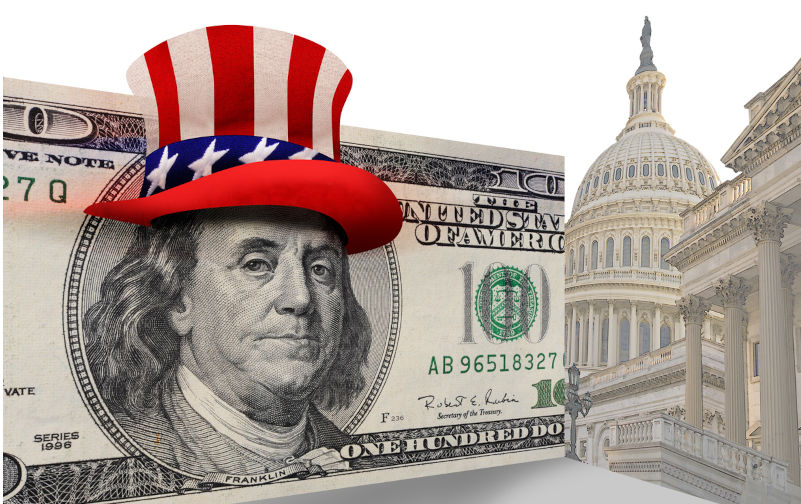The US is a very foreign country
August 5, 2025
The Albanese Government has recently handed over a second tranche of some $800 million Australian tax-payers’ dollars to the United States, with the total now more than a billion dollars. This is part of the most woeful con job ever in the grim history of Australia’s defence procurement record – AUKUS.
The most spurious argument for justifying this profligacy by the Australian Government is that it affirms Canberra’s unconditional commitment to the alliance with Washington spelt out in the flimsy conditions of the ANZUS treaty. This has resulted in successive Australian Governments eagerly selling out the country’s sovereignty to the US. As has been pointed out time and again, Australia has accompanied the US in all its wars since World War II, all of which have failed to achieve their stated objectives. The cost in terms of Australian blood and treasure has been enormous. Moreover, this is despite the fact that the security interests of the two countries are widely divergent, increasingly so.
The craziness of both ANZUS and now AUKUS is routinely accompanied by the claim that America and Australia are joined at the cultural hip, that they share a wide range of social and political values. This claim has absolutely no basis in historical fact. Nonetheless, it is routinely trotted out by sillier Australian politicians and commentators, promoting the dangerous falsehood that we will always get along well with whoever is in charge in Washington, simply because our countries’ cultural values are so alike. Nothing could be further from the truth. Culturally, and in terms of their political histories, Australia and America are like chalk and cheese.
- The US: A political culture underpinned by doctrinaire liberal individualism
In the 1950s, Professor Louis Hartz, a pre-eminent scholar on the history of America’s liberal culture, documented how the modern US has evolved from the hyper-individualist ideologies of the Pilgrim and Puritan pioneers of the American colonies in the 17th century. His writings continue to be influential today. (See his classic work, The Liberal Tradition in America; also his essay in the edited volume, The Founding of New Societies.) Hartz mapped how liberalism has evolved into the culturally entrenched belief that prevails in the self-serving doctrine of American exceptionalism, fostering the populist view that modern America is destined to lead the world. (One of the worst evocations of this deluded dogma is Francis Fukuyama’s The End of History).
Hartz saw how the individualist legacy passed on from America’s early settler colonisers has resulted in a deep-seated distrust of collectivist public policies, especially democratic socialist and traditional conservative views about the organic inter-connectedness of society’s peoples and institutions (a view share by genuine socialists and conservatives alike). For example, the Second Amendment to the US Constitution, ratified on 15 December 1791, guarantees each American citizen the right to own and bear arms. Its original proponents saw it as a fundamental right of each individual citizen, as do its advocates today. The consequences have been horrendous (think: shootings in schools). However, attempts to rescind it are strongly opposed by many a stalwart American individualist, aided and abetted by the National Rifle Association and similar right-wing politicians, like Trump, in the Republican party and not a few among the Democrats.
In 1994, the mild reforms to the US’s health insurance system proposed by President Obama (Obamacare) were widely resisted as evidence of an evil socialist turn in American politics. The political and cultural legacy of this distorted hyper-individualism is one of the root causes of the bitter divisiveness confounding politics in the US today and intensifying the riven nature of contemporary American society.
The Trump era is merely the latest stage in the unfolding of these historical realities. Importantly, it highlights the fundamental differences between the cultures of America and Australia. Those differences have existed from the very beginning of ANZUS, and even before. In cultural terms, the two countries could not be more unalike. It’s time for those Australian who adhere to this nonsense to dispense with their fantasising. They fool no one but themselves.
- Australia: A political culture characterised by a ‘characteristic talent for bureaucracy’
The settler colonists who arrived on the Australian continent in the late 18th and early 19th centuries were unburdened by the puritanical belief in the inalienable rights of would-be possessive individuals that then burdened (and continue to burden) people in the US. Instead, Australia’s early white settlers looked to the authorities to initiate and sustain social and economic developments in the colonies, especially after the separate colonies became self-governing in the 1850s.
Upon federation (1901), the new Commonwealth Government took over the leadership role of the former colonial (now state) governments in managing the affairs of its citizens. The Harvester judgment in 1907 laid the foundation of a basic wage tradition that distinguished Australia for many years. Australia soon followed New Zealand in establishing state welfare policies as well as the universal adult franchise. These developments were described at the turn of the century by the visiting French writer Albert Metin as “socialism without a doctrine". It involved the pragmatic development of a state apparatus to underwrite the well-being of the Australian people and their institutions, highlighting the fact, as the political scientist A.F. Davies once pointed out, that Australians have a “talent for bureaucracy".
In short, government has been an important and meaningful player in Australia’s historical development, socially, economically and culturally. It far surpasses the US with its range of collectivist public policies seeking to place a welfare safety net under society and promote an egalitarian culture and society. The Fair Work Act, for example, would be intolerable to the American mind. The Howard Government’s restrictions on guns in the community would be anathema to America’s NRA and its brutish advocates. And Australia’s Medicare system, beside which even Obamacare pales into insignificance, would be written off by most Americans as a socialist plot.
This only scratches the surface of the deep structural differences that set the cultures of America and Australia miles apart. Leaders like Richard Marles, who seek to tie their country to Uncle Sam’s coattails, are endangering an Australia that should be standing tall, an independent country, one that is proud of its cultural and political achievements within its region and globally. The hyper-liberal individualist tradition in American has failed that country badly. It is reaching its end point with the ascendance of Donald Trump and his populist MAGA base.
The views expressed in this article may or may not reflect those of Pearls and Irritations.


